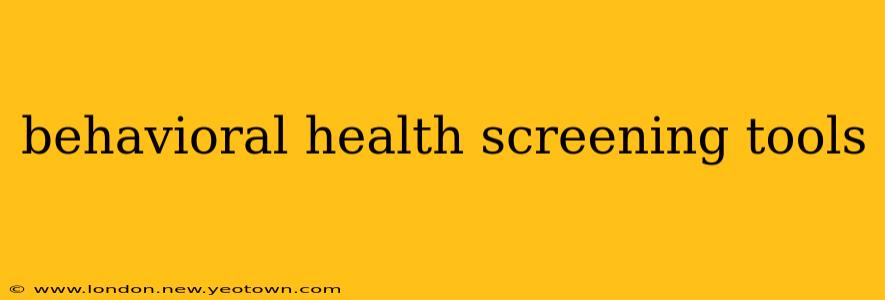The quiet hum of daily life can often mask the struggles individuals face with their mental and emotional well-being. Early detection is key in navigating the complexities of behavioral health challenges, and that's where behavioral health screening tools come in. These invaluable resources offer a quick and efficient way to identify potential issues, paving the way for timely intervention and improved outcomes. But with so many options available, understanding how to choose and utilize these tools effectively is crucial. This comprehensive guide will navigate you through the landscape of behavioral health screening, answering your key questions and empowering you to make informed decisions.
What are Behavioral Health Screening Tools?
Behavioral health screening tools are standardized questionnaires or assessments designed to identify individuals who may be at risk for or experiencing a range of mental health conditions. They aren't diagnostic tools; instead, they act as a first step, flagging potential concerns that warrant further evaluation by a mental health professional. Think of them as a preliminary health check-up, but for your mind and emotions. These tools can cover a wide spectrum of issues, from anxiety and depression to substance abuse and trauma.
What are the Different Types of Behavioral Health Screening Tools?
There's a diverse array of behavioral health screening tools catering to different needs and populations. Some focus on specific disorders, while others provide a broader assessment of overall mental well-being.
Self-Report Questionnaires: These are the most common type, requiring individuals to answer questions about their thoughts, feelings, and behaviors. Examples include:
- PHQ-9 (Patient Health Questionnaire-9): Widely used to screen for depression.
- GAD-7 (Generalized Anxiety Disorder-7): A brief screening tool for generalized anxiety disorder.
- AUDIT (Alcohol Use Disorders Identification Test): Screens for problematic alcohol use.
- CRAFFT (Car, Relax, Alone, Forget, Friends, Trouble): A brief screening tool for substance abuse in adolescents.
Structured Interviews: These involve a clinician asking a series of pre-determined questions, allowing for a more in-depth assessment. They often incorporate elements of clinical judgment.
Observational Assessments: These rely on direct observation of an individual's behavior by a trained professional. This can be particularly useful for individuals who may have difficulty self-reporting their experiences.
How Accurate are Behavioral Health Screening Tools?
The accuracy of behavioral health screening tools varies. While they're valuable for identifying potential issues, they're not perfect. False positives (identifying someone as having a condition when they don't) and false negatives (missing a condition) can occur. That's why it's crucial to interpret the results in conjunction with a comprehensive clinical evaluation. A trained professional can consider the screening results alongside other factors, such as medical history and behavioral observations, to arrive at an accurate diagnosis.
Who Should Use Behavioral Health Screening Tools?
Behavioral health screening tools can benefit a wide range of individuals and settings:
- Primary care physicians: Integrating screening into routine check-ups can identify mental health concerns early on.
- Schools: Screening students can help identify those needing support services.
- Employers: Workplace screening programs can promote employee well-being and reduce absenteeism.
- Individuals: Self-administered screening can raise awareness of potential issues and encourage seeking professional help.
What are the Limitations of Behavioral Health Screening Tools?
It's important to acknowledge the limitations of screening tools. They don’t provide a definitive diagnosis. Cultural factors, language barriers, and individual differences can affect the accuracy of self-reported questionnaires. Furthermore, some individuals may be reluctant to honestly disclose their struggles, leading to inaccurate results.
Where Can I Find Behavioral Health Screening Tools?
Many reputable organizations offer freely accessible screening tools online. However, it’s important to be discerning about the source. Always verify the credibility of the organization and ensure the tool is validated and reliable. Your healthcare provider can also guide you toward appropriate screening tools and resources.
Conclusion: A Stepping Stone to Better Mental Health
Behavioral health screening tools are powerful resources for early detection and intervention. While they don't replace the expertise of a mental health professional, they provide a crucial first step in identifying potential challenges and accessing the necessary support. By understanding their uses, limitations, and the importance of professional interpretation, you can effectively utilize these tools to improve the well-being of yourself or others. Remember, seeking help is a sign of strength, and early intervention can significantly improve outcomes.

